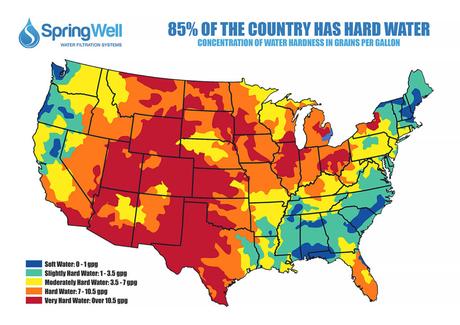How To Remove “Hardness” from Your Drinking Water with a Home Water Softener
Look carefully. Do you notice any limescale deposits around your pipes, faucets, sinks, and shower fixtures? Perhaps you have started to use more soap and detergent than usual lately, and there are thick soapy residues on your skin after you shower.
If any of these pain points describe your situation, you are not alone. “Hard” water affects over 85% of the water supply in the United States.

By definition, “Water described as “hard” means that it is high in dissolved minerals, specifically calcium and magnesium.” Because of the structure of these chemicals, they can bond easily with other types of metals. Over time, these bonds transform into hardened deposits that remain on your shower heads, in your pipes, and other areas in your home.
Health wise, hard water is harmless. You can drink it and can even use it around the house for activities like watering your garden, general lawn care, etc. But for household use, that’s a whole different story. Hard water can interfere with your cleaning tasks – from laundering and dish washing to showering and personal grooming. It can also cause damage to your central heating systems and water-using appliances, which often require costly repairs.
In most cases, a water softener is a powerful remedy for hard water problems. But let’s find out if it is worth the investment.
How Does A Water Softener Work?
Basically, a salt based water softener works to remove high concentrations of calcium and magnesium from water through a process called “ion exchange.” This process “softens” hard water by substituting the hardness minerals (calcium and magnesium) with sodium chloride (salt).
Here’s a quick overview of the process:
- The hard water enters the water softener.
- Tiny beads (containing sodium) in the resin bed attract the hard water minerals, removing them from the water and onto the resin bed.
- Soft water enters your home with none of those hard water minerals like calcium and magnesium
- When the resin beads are full of hard water minerals, it’s time for the regeneration process.
- During regeneration, the brine is pumped through the resin tank.
- The brine solution and the hard water minerals are flushed from the tank into a nearby drain or for reuse before the softening process starts again.
Instead of using ion-exchange (which uses salt), salt-free water softeners use a physical process known as Template Assisted Crystallization (TAC). This process converts the hardness minerals into a hardness crystal that will not stick to any surface in your home, thus keeping your appliances and hot water heaters free of hard water scale buildup.
Related: The Difference Between Salt-Based and Salt-Free Water Softeners
The Incredible Benefits of a Water Softener
Most quality water softeners can be a big purchase, but they sure offer some significant benefits.
- Improves the efficiency of hot water and heating systems
- Soft water is better for certain dry skin conditions like eczema
- Helps reduce the amount of household items and toiletries you use, such as shampoo, conditioner, soap, laundry detergents, and other cleaning products
- Soften water makes your skin and hair feel softer and easier to manage
- Extends the lifespan of and increases the performance of home appliances such as washing machines, dishwashers, kettles, etc.
- Reduces the scale on pipes, fixtures, and appliances
With soft water, you no longer have to worry about rising energy costs because your appliances are operating inefficiently or expensive repair costs. You will also benefit from longer-lasting clothing, your detergents will work more effectively and your skin will feel smoother and softer after you take a shower or a bath.
Our high-tech salt-based and salt-free water softening systems are designed to solve all the problems associated with hard water. Plus, they are easy to install, environmentally-friendly and virtually maintenance-free.
Verdict
Hard water is still a major problem for 85% of households in the U.S. While it is not a threat to one’s health, it can wreak havoc in your home, affecting pipes, fixtures, and water-using appliances. Thankfully, a premium water softener can work to solve all the problems related to hard water in your home.
